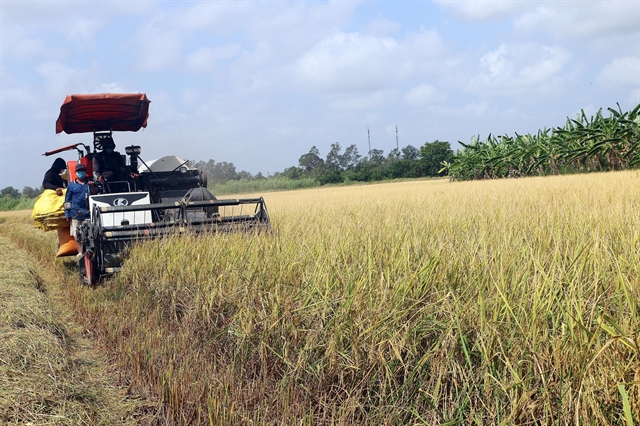 |
| Harvesting rice in the southern province of Sóc Trăng. — VNA/VNS Photo Tuấn Phi |
HÀ NỘI — Việt Nam aims to use organic fertiliser for 50 per cent of the total cultivation area nationwide by 2050, and have at least 80 per cent of centrally-run cities and provinces build organic fertiliser-using farming models as part of value chains for major and specialty products.
Those are among targets set in a project on promotion of production and use of organic fertilisers until 2030 with a vision to 2050 that has been approved by the Ministry of Agriculture and Rural Development (MARD).
Also under the project, 100 per cent of available raw materials from farming, husbandry, fisheries and household waste will be used as organic fertiliser on both household and industrial production scales.
In the shorter term, the agricultural sector aims to raise the proportion of licensed organic fertiliser products to over 30 per cent of the total number of fertiliser products on the market, while increasing the organic fertiliser production capacity of qualified production facilities to five million tonnes per year.
At the same time, the amount of industrial organic fertiliser is expected to account for at least 30 per cent of the total amount of fertiliser used in agricultural production. The amount of organic fertiliser produced on a household scale used in agricultural production is hoped to reach at least 20 million tonnes per year.
The agricultural sector also aims to build effective cultivation models using organic fertilisers for nine key groups of crops, namely rice, coffee, rubber, cashew, pepper, tea, fruit trees, vegetables, and cassava.
The ministry sees the production and use of organic fertiliser based on utilising agricultural by-products is an inevitable trend of Việt Nam’s agricultural sector. It is also a sustainable solution to reducing the use of inorganic fertiliser and the dependence on imports.
To this end, along with optimising the use of agricultural by-products, the MARD will complete a system of technical criteria and standards as well as the testing system for organic fertilisers, and support farmers in applying advanced technologies and provide them with guidelines in fertiliser use.
It will create favourable conditions for the registration and licensing of organic fertilisers, while encouraging the development, production and use of organic fertilisers among farmer households by making full use of agricultural by-products and daily waste. — VNS
- Reduce Hair Loss with PURA D’OR Gold Label Shampoo
- Castor Oil Has Made a “Huge” Difference With Hair and Brow Growth
- Excessive hair loss in men: Signs of illness that cannot be subjective
- Dịch Vụ SEO Website ở Los Angeles, CA: đưa trang web doanh nghiệp bạn lên top Google
- Nails Salon Sierra Madre
 VnExpress News The News Gateway of Vietnam
VnExpress News The News Gateway of Vietnam




